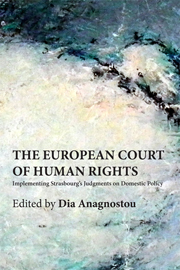Book contents
- Frontmatter
- Contents
- The contributors
- Acknowledgements
- Introduction: Untangling the domestic implementation of the European Court of Human Rights' judgments
- Part I INSTITUTIONAL DYNAMICS OF DOMESTIC IMPLEMENTATION
- 1 The interrelationship between domestic judicial mechanisms and the Strasbourg Court rulings in Germany
- 2 Between political inertia and timid judicial activism: the attempts to overcome the Italian ‘implementation failure’
- 3 The reluctant embrace: the impact of the European Court of Human Rights in post-communist Romania
- Part II LEGAL MOBILISATION AND THE POLITICAL CONTEXT OF IMPLEMENTATION
- List of European Court of Human Rights judgments and European Commission on Human Rights cases
- Index
1 - The interrelationship between domestic judicial mechanisms and the Strasbourg Court rulings in Germany
from Part I - INSTITUTIONAL DYNAMICS OF DOMESTIC IMPLEMENTATION
Published online by Cambridge University Press: 05 April 2014
- Frontmatter
- Contents
- The contributors
- Acknowledgements
- Introduction: Untangling the domestic implementation of the European Court of Human Rights' judgments
- Part I INSTITUTIONAL DYNAMICS OF DOMESTIC IMPLEMENTATION
- 1 The interrelationship between domestic judicial mechanisms and the Strasbourg Court rulings in Germany
- 2 Between political inertia and timid judicial activism: the attempts to overcome the Italian ‘implementation failure’
- 3 The reluctant embrace: the impact of the European Court of Human Rights in post-communist Romania
- Part II LEGAL MOBILISATION AND THE POLITICAL CONTEXT OF IMPLEMENTATION
- List of European Court of Human Rights judgments and European Commission on Human Rights cases
- Index
Summary
The European Convention on Human Rights (hereafter ECHR, or Convention) has gained more importance within the multi-level system of judicial protection of human rights in Germany in recent years. The number of adverse judgments against Germany delivered by the European Court of Human Rights (hereafter ECtHR, or Strasbourg Court) has been relatively low compared with other member states of the Council of Europe. In 2007 and 2008, the ECtHR found a violation of the Convention in seven and six judgments respectively. The number is even lower when one looks into the records before the Strasbourg Court became a permanent institution in 1998. However, since 2009 an increase of adverse judgments against Germany can be observed, with the ECtHR delivering twenty-nine adverse judgments in 2010 and thirty-one in 2011. Even though several of the judgments concerned repetitive cases, the Strasbourg Court has for the first time decided on significant topics like preventive detention in Germany. It also issued its first pilot judgment against Germany regarding excessive length of court proceedings, as well as judgments on freedom of expression and the protection of whistleblowers. The increase in adverse judgments, as well as the importance of the issues they involve, raise significant questions concerning the role of the ECtHR's judgments in the domestic system of human rights protection.
- Type
- Chapter
- Information
- The European Court of Human RightsImplementing Strasbourg's Judgments on Domestic Policy, pp. 27 - 48Publisher: Edinburgh University PressPrint publication year: 2013

